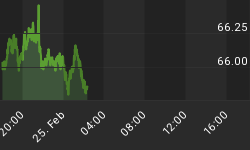The Euro was supposed to lift all boats. Italy was left behind, and will stay there for two more decades according to the IMF.
Please consider Italy 'Facing 20 Years of Economic Woe'
The IMF has warned that Italy faces two decades of stagnant economic growth.
Its latest report on the country puts growth this year at under 1%, down from its previous 1.1% estimate, and forecasts growth in 2017 of about 1% - down from a 1.25% estimate.
The IMF says Italy will not reach pre-crisis levels until 2025, by which time its neighbours will have economies 20-25% above 2008 levels.
Italy is the third largest eurozone country.
It has 11% unemployment and a banking sector in crisis, with government debt second only to that of Greece.
Italy GDP 1961 to Present

Italy GDP Since Joining Eurozone

Charts from World Bank.
Italy has been in decline for a long time. The eurozone was supposed to help. It didn't.
Decline and Fall of Italy

Italy vs. Eurozone
The Economist discusses The Italian Job.
Italy's experience within the euro zone has been miserable. It has been in recession for five of the past eight years. Real (ie, adjusted for inflation) GDP per person is lower than in 1999. Sovereign debt has risen above 130% of GDP. Worse, Italy's economy is woefully uncompetitive. Since 1998 productivity has fallen steadily. Labour costs, however, have not. Since Italy joined the euro, exports have ceased to be a driver of growth, which has consequently slowed. A slowdown is not something a country with such daunting debts can afford.
There is no shortage of explanations for Italy's slump in productivity. Thanks to punitive regulation of labour and product markets, it is one of the most expensive places in the rich world to start a new business. Taxes and red tape strongly discourage productive firms from growing very large. Nearly 70% of Italian workers labour in firms with fewer than 50 employees, compared with about a third in America. The government taxes income from labour far more heavily than consumption, discouraging work (and encouraging evasion). Perhaps most worrying, the share of young Italian workers with a university degree is among the lowest in the rich world. At just under 10%, the share of highly educated Italians living abroad is also among the highest in the rich world.
The slowdown in productivity occurred just as Italy joined the single currency. Some economists see this as coincidental. The euro was born just as the global economy was undergoing a rapid bout of globalisation. Italy's small firms did not scale up to capitalise on emerging-market demand, as Germany's did. By the same token, its under-skilled population could not take advantage of the rising return to trade in professional services, as firms in America and Britain did.
Rather than waiting for productivity to rise, a quicker route to faster growth is to drive down wages. Indeed, Mr Renzi's advisers suggest that the government may seek to impose a decentralised wage-setting process if negotiations between trade unions and industry do not yield one.
Yet even the benefits of wage restraint could be disappointing. Germany's competitiveness drive occurred during an era of relatively strong global growth and relatively buoyant inflation, which made the suppression of real wages both less painful and less noticeable. Italy will enjoy no such help. Any growth scheme that rests on falling wages is unlikely to endear Italians to Mr Renzi. For his reforms to work, he will need time that voters are unlikely to grant him. Keeping Italy happy enough to stay in the euro zone will, in the short term, take much faster growth across the euro area as a whole, fostered by continued dovishness from the ECB and less finickiness from the European Commission.
If the euro area is to keep Italy on board, it will need to become a bit less austere and a bit more Italian.
Italy Roundup
- July 4: Merkel-Renzi Showdown: Italy Threatens to Defy Merkel, Brussels Over bank Bailouts
- July 4: ECB Triggers Another Bank Shares Selloff, Tells Monte dei Paschi to Shed More Assets
- July 6: "Italian Gov't Collapse More Than Just a Possibility"
- July 10: Deutsche Bank Chief Economist: "Europe is Seriously Ill", Banks Need €150 Billion Bailout















